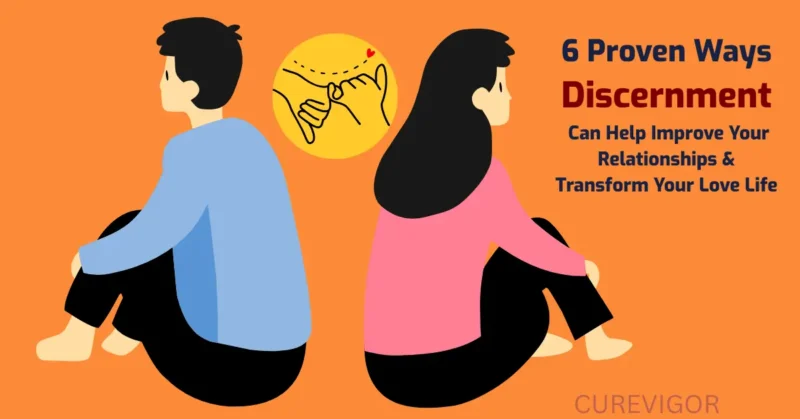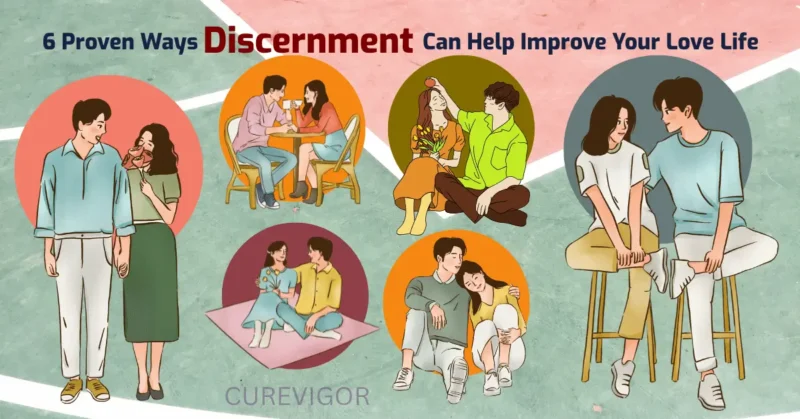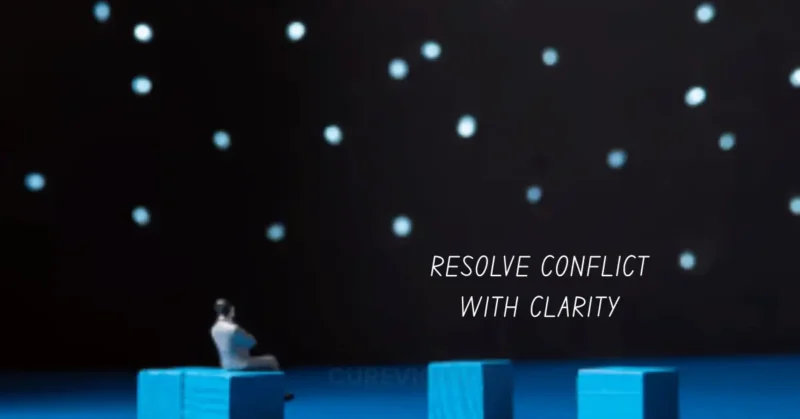Find out how discernment—the ability to see people and situations clearly—can help you build stronger, more authentic, and fulfilling relationships. Learn six practical ways to apply discernment to love, trust, and connection.
Thank you for reading this post, don't forget to subscribe!Discernment is a guide for powerful, growing relationships. It gives you a glimpse into people’s motivations, a point to set boundaries with others, or to let things be between you, to attract genuine people.
If it characterizes many relationships, a good feeling goes with trust in who’s worth going deep with, a sense of how disagreements can solve themselves through people, and a sense of who to use your guts to trust.
Why Discernment is the Hidden Key to Healthier Relationships
In love and relationships, we often talk about chemistry, communication, and compatibility—but rarely about discernment. Yet discernment is the quiet power behind every strong connection.
It helps you recognize who belongs in your life, set boundaries without guilt, and see through surface charm to what’s real.

Discernment is the ability to judge well—not with suspicion, but with wisdom. It blends intuition, emotional intelligence, and observation. When you practice it, you become more aware of motives, patterns, and intentions—both in others and in yourself.
Whether you’re dating, navigating friendships, or deepening a long-term partnership, discernment helps you make better choices and protect your peace.
Here are six proven ways discernment can transform your relationships and love life.

1. Spot Genuine, Like-Minded People
Discernment allows you to look beyond appearances and words. Instead of being swayed by charm or first impressions, you begin to notice consistency—whether people’s actions match what they say.
When you use discernment, you notice patterns. Does someone listen with care? Do they follow through? Are they kind when it’s inconvenient? These small details reveal character.
Action step: The next time you meet someone new, take note of how you feel after spending time with them—energized, peaceful, drained, or uneasy? Your body and intuition often sense what your mind overlooks.
Over time, discernment guides you toward relationships grounded in mutual respect, shared values, and genuine support rather than temporary attraction or convenience.
2. Set Healthy Relationship Boundaries
Healthy boundaries are the foundation of any fulfilling relationship. But knowing where to draw those lines can be hard—especially for people who are empathetic or giving.
Discernment helps you see where to say yes and when to step back. When you’re discerning, you understand your needs and limits.
You learn that saying no is not rejection—it’s self-respect. Boundaries are how you teach others to value you and how you protect your emotional space.

Try this: Write down three situations that often leave you feeling drained. Then ask: what boundary could protect my energy here? Start practicing that boundary this week.
As you grow comfortable expressing your limits, you’ll notice your relationships becoming more balanced, respectful, and emotionally safe.
3. Resolve Conflict with Clarity
Every relationship faces conflict. The difference between couples who thrive and those who crumble often comes down to how they handle disagreements.
Discernment gives you clarity in the middle of emotional storms. It helps you pause before reacting, listen deeply, and speak with intention.
Instead of trying to win an argument, you focus on understanding the other person and being understood.

When you approach conflict with discernment, you ask questions like:
- What’s the real issue here?
- Am I responding from truth or from ego?
- How can we resolve this in a way that respects both sides?
This mindful approach turns disagreements into opportunities for growth instead of resentment.
Pro tip: During tension, slow down your speech and breathe before responding. Calm communication signals emotional maturity—and invites the same in return.
4. Build Trust and Strengthen Intuition
Discernment sharpens both your logic and your intuition. It teaches you to listen to your instincts—the quiet signals that tell you when something feels right or off.
Trust starts with yourself. When you consistently make choices aligned with your values, you begin to trust your own judgment. That confidence radiates outward, helping you build trust with others based on authenticity, not fear or control.

Over time, discernment becomes your internal compass. It alerts you to red flags—such as inconsistent communication, lack of accountability, or emotional manipulation—before you get entangled.
Example: You might notice early on that a new partner avoids honest conversations. Instead of rationalizing it away, discernment helps you pause and reassess—saving you from future heartache.
When you trust your intuition, you attract relationships that are rooted in honesty and emotional safety.
5. Grow Empathy and Understanding
One of the most surprising outcomes of discernment is that it doesn’t make you judgmental—it makes you compassionate. When you can see clearly, you understand more deeply.
Discernment allows you to view situations from multiple perspectives. You start to recognize that people’s behaviors often reflect their wounds, not their worth. This awareness creates empathy without enabling toxicity.
In practice, discernment-driven empathy might look like this:
- Listening without assuming.
- Validating others’ emotions without losing your own voice.
- Knowing when to help—and when to step back.
This balanced empathy builds emotional maturity and attracts people who communicate authentically and reciprocate understanding.
Action step: The next time someone upsets you, ask yourself: What might this person be feeling beneath their reaction? This doesn’t excuse poor behavior—but it helps you respond with calm instead of chaos.
6. Create Lasting, Fulfilling Relationships
Discernment helps you invest your energy where it matters. Instead of scattering yourself across shallow connections, you begin choosing depth over distraction.
When you practice discernment, you naturally attract people who align with your integrity and growth. These are the relationships that stand the test of time—built on honesty, effort, and shared values.
Such discernment-driven relationships often bring:
- Mutual encouragement and growth.
- Respectful communication.
- Emotional safety and vulnerability.
In the end, discernment helps you build an inner circle of people who genuinely care, celebrate your wins, and stand with you during hard times.

Bonus Insight: Discernment Helps You See What Truly Brings Happiness—Love or Money?
Many people wonder: what really makes life fulfilling—financial success or meaningful relationships? Discernment helps you see beyond social pressure to your personal truth.
Money can provide comfort and opportunity, but connection provides meaning. Discernment allows you to balance both wisely—to recognize when you’re chasing things instead of fulfillment.
It encourages you to ask:
- Does this choice align with my values?
- Does it bring peace or just momentary pleasure?
When you make decisions from discernment, you don’t settle for empty achievements or unbalanced love. You create a life that feels rich—inside and out.
FAQs
Q: What are the six qualities of discernment?
The six core qualities of discernment are clarity, patience, intuition, integrity, empathy, and wisdom. Clarity helps you see situations as they are, not as you wish they were. Patience allows time for truth to surface.
Intuition connects logic with gut sense. Integrity ensures your choices align with your values. Empathy helps you understand others without losing yourself, and wisdom turns every experience—good or bad—into insight for better decisions.
Q: What are the 7 steps of discernment?
The seven steps of discernment generally include: awareness, reflection, seeking truth, emotional balance, counsel, decision, and confirmation.
You start by becoming aware of what’s happening, then reflect honestly on motives and feelings. Next, you search for truth through facts or prayer.
Emotional balance ensures calm decision-making. Seeking wise counsel adds perspective. After deciding, you look for confirmation—inner peace or external signs that affirm your choice.
Q: What are the 5 C’s of discernment?
The 5 C’s of discernment are Clarity, Consistency, Character, Counsel, and Confirmation. Clarity means understanding the situation fully. Consistency tests whether choices align with long-term values.
Character checks if actions match integrity. Counsel reminds you to seek advice from trusted, objective people. Finally, confirmation is the peace or assurance that follows a right decision—your internal signal that you’re on the right path.
Q: What are the 7 gifts of discernment?
The seven gifts of discernment are often described as wisdom, understanding, counsel, fortitude, knowledge, piety, and reverence. These qualities help people perceive truth beyond surface appearances.
Wisdom and understanding allow deep insight. Counsel and fortitude bring courage to act rightly.
Knowledge helps distinguish fact from illusion, while piety and reverence cultivate humility and respect for a higher purpose. Together, these gifts refine moral and emotional intelligence.
Q: What is Rule 5 of discernment?
Rule 5 of discernment, often drawn from St. Ignatius’ principles, advises: do not make major decisions in moments of inner turmoil or desolation. When emotions are low or confusion is high, judgment becomes clouded.
The rule teaches patience—wait until clarity and peace return before deciding. Acting impulsively in darkness can lead to regret, while waiting for light leads to choices grounded in truth and balance.
Q: What are the 4 voices of discernment?
The four voices of discernment are the voice of self, the voice of others, the voice of circumstance, and the voice of the divine (or inner wisdom).
The voice of the self reflects your desires and fears. The voice of others brings perspective but can also carry bias. Circumstances reveal practical realities and timing.
The divine or intuitive voice—often quietest—offers direction that aligns with peace and purpose. Discernment means learning which voice deserves your trust in each moment.
Key Takeaways
- Discernment lets you choose relationships that add genuine value to your life.
- It helps you establish healthy boundaries and communicate with clarity.
- It strengthens your self-trust and protects your emotional well-being.
- It turns empathy into a strength, not a weakness.
- Practicing discernment daily leads to richer, more meaningful relationships.
Final Thoughts: Build a Love Life Rooted in Wisdom
Discernment is more than a skill—it’s a lifestyle. When you make it part of your daily choices, your relationships transform.
You attract authenticity, let go of confusion, and find peace in knowing who belongs in your space.
Start small: pause before reacting, trust your senses, and align your actions with your values. With time, you’ll notice your love life—and your overall peace—begin to change.
Practice discernment, and you won’t just find better relationships—you’ll create them.
Get more Life Balance Tips.
You might like to read:


